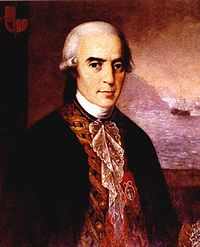- Antonio de Ulloa
-
Antonio de Ulloa 
Born 12 January 1716
SevilleDied 3 July 1795 (aged 79)
Isla de LeónNationality Spanish Fields astronomy Known for platinum Antonio de Ulloa y de la Torre-Girault (12 January 1716 – 3 July 1795) was a Spanish general, explorer, author, astronomer, colonial administrator and the first Spanish governor of Louisiana.
Contents
Life
Ulloa was born in Seville, Spain. His father was an economist. Ulloa entered the navy in 1733. In 1735, he, along with fellow Spaniard Jorge Juan, was appointed to the French Geodesic Mission, a scientific expedition which the French Academy of Sciences was sending to present-day Ecuador to measure a degree of meridian arc at the equator.
He remained there from 1736 to 1744, during which the two Spaniards discovered the element platinum. In 1745, having finished their scientific labours, Ulloa and Jorge Juan prepared to return to Spain, agreeing to travel on different ships in order to minimize the danger of losing the important fruits of their labours.
The ship upon which Ulloa was travelling was captured by the British, and he was taken to England as a prisoner. In that country, through his scientific attainments, he gained the friendship of the men of science, and was made a Fellow of the Royal Society of London. In a short time, through the influence of the president of this society, he was released and was able to return to Spain. He published an account of the people and countries he had encountered during the French Geodesic Mission (1748), which was translated into English as A Voyage to South America.
He became prominent as a scientist and was appointed to serve on various important scientific commissions. He is credited with the establishment of the first museum of natural history, the first metallurgical laboratory in Spain, and the observatory of Cadiz. In 1751, de Ulloa was elected a foreign member of the Royal Swedish Academy of Sciences.
In 1758 he returned to South America as governor of Huancavelica in Peru and the general manager of the quicksilver mines there. He held this position until 1764.
He arrived on 5 March 1766 in New Orleans to serve as the first Spanish governor of West Louisiana. The French colonists refused to recognize Spanish rule, and de Ulloa was expelled from Louisiana by a Creole uprising during the Louisiana Rebellion of 1768.
For the remainder of his life, he served as a naval officer. In 1779 he became lieutenant-general of the naval forces. Ulloa died at Isla de Leon, Cádiz, in 1795.
Legacy
As a result of his scientific work in Peru, he published (Madrid, 1784) Relación histórica del viaje á la América Meridional, which contains a full, accurate, and clear description of the greater part of South America geographically, and of its inhabitants and natural history. In collaboration with the Jorge Juan mentioned above, he also wrote Noticias secretas de América, giving valuable information regarding the early religious orders in Spanish America. This work was published by David Barry in London, 1826.
His name is also recalled as the meteorological term Ulloa's halo (also known as Bouguer's halo), which an observer may see infrequently in fog when sun breaks through (for example, on a mountain) — effectively a "fog-bow" (as opposed to a "rain-bow"). A fog-bow is defined as "an infrequently observed meteorological phenomenon; a faint white, circular arc or complete ring of light that has a radius of 39 degrees and is centered on the antisolar point. When observed, it is usually in the form of a separate outer ring around an anticorona." (Tricker, R. A. R., 1970: An Introduction to Meteorological Optics, pages 192–193).
References
- Ferreiro, Larrie: Measure of the Earth: The Enlightenment Expedition that Reshaped Our World (New York: Basic Books, 2011) ISBN 9780465017232 [1]
- ^ Ferreiro, Larrie (2011). Measure of the Earth: The Enlightenment Expedition that Reshaped Our World. New York: Basic Books. p. 376. ISBN 9780465017232. http://www.perseusacademic.com/book.php?isbn=9780465017232.
External links
- Noticias Secretas de América, sobre el estado naval, militar y político del Perú y provincia de Quito - 1748.
Preceded by
Charles Philippe AubrySpanish Governor of Louisiana
1766–1768Succeeded by
Charles Philippe Aubry (acting) This article incorporates text from a publication now in the public domain: Herbermann, Charles, ed (1913). Catholic Encyclopedia. Robert Appleton Company.Categories:
This article incorporates text from a publication now in the public domain: Herbermann, Charles, ed (1913). Catholic Encyclopedia. Robert Appleton Company.Categories:- 1716 births
- 1795 deaths
- Spanish astronomers
- Spanish meteorologists
- Discoverers of chemical elements
- Spanish generals
- 18th-century astronomers
- Spanish explorers
- Governors of Louisiana
- Spanish colonial governors and administrators
- People of New Spain
- Members of the Royal Swedish Academy of Sciences
- People from Seville
- 18th-century Spanish people
- Fellows of the Royal Society
Wikimedia Foundation. 2010.
